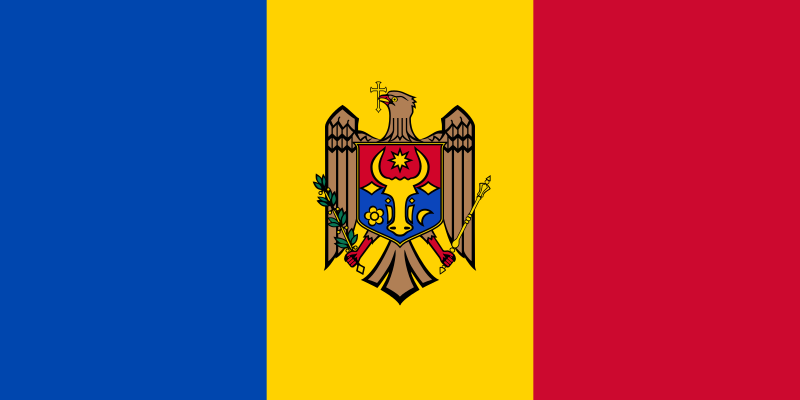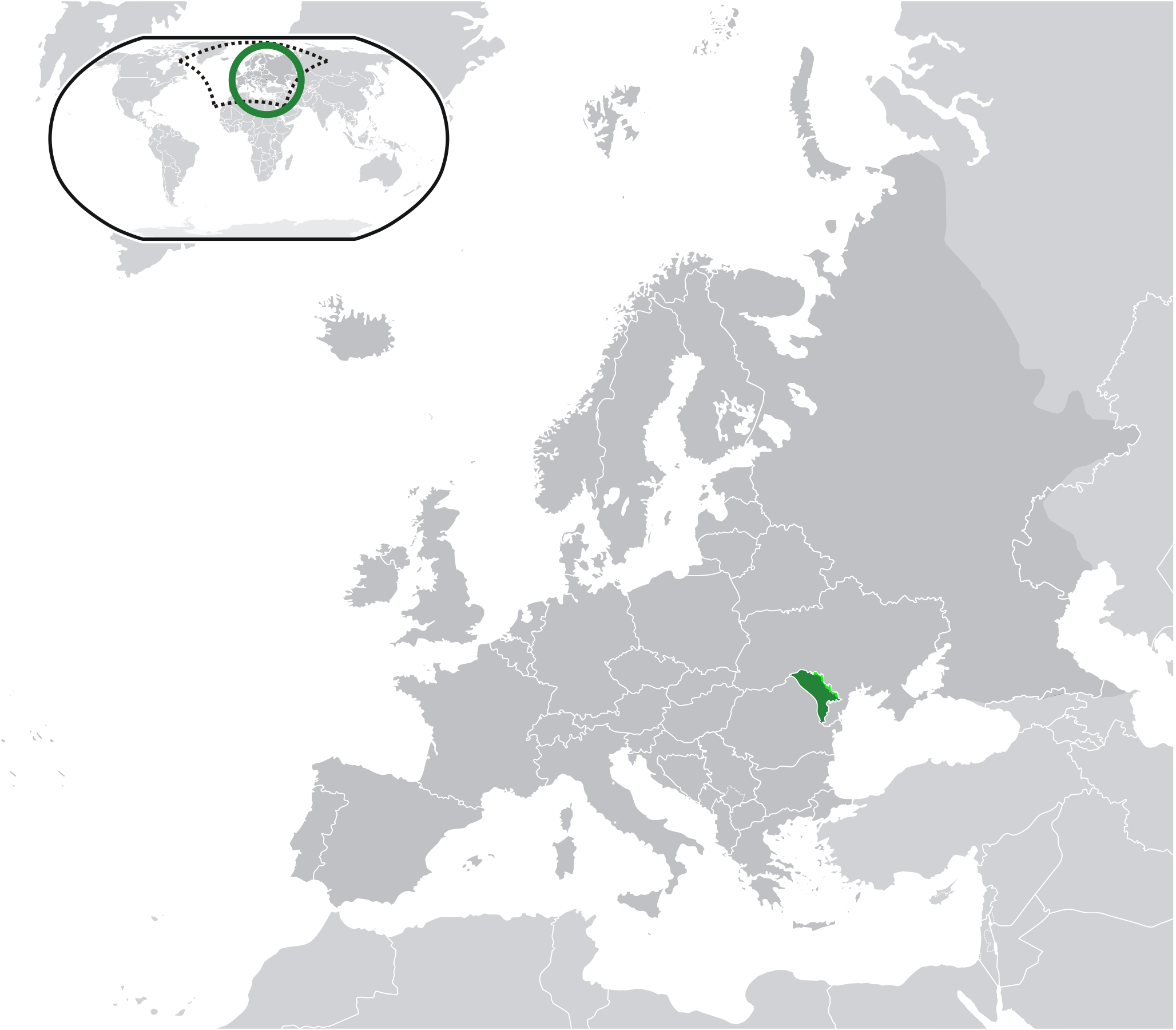More languages
More actions
(Transnistria —> Pridnestrovie) Tag: Visual edit |
(Corruption) Tag: Visual edit |
||
| (3 intermediate revisions by 3 users not shown) | |||
| Line 1: | Line 1: | ||
{{Infobox country|name=Republic of Moldova|native_name=Republica Moldova|population_estimate=2,597,100|population_estimate_year=2021|area_km2=33,843.5|mode_of_production=Capitalism|government_type=Unitary parliamentary republic|leader_title1=President|leader_title2=Prime Minister|leader_name1=Maia Sandu|leader_name2=Natalia Gavrilița|image_map=Moldova map.png|map_width=290|map_caption= | {{Infobox country|name=Republic of Moldova|native_name=Republica Moldova|population_estimate=2,597,100|population_estimate_year=2021|area_km2=33,843.5|mode_of_production=Capitalism|government_type=Unitary parliamentary republic|leader_title1=President|leader_title2=Prime Minister|leader_name1=Maia Sandu|leader_name2=Natalia Gavrilița|image_map=Moldova map.png|map_width=290|map_caption=Pridnestrovie is in light green.|official_languages=Romanian|image_flag=Moldova flag.png|image_coat=Coat of arms of Moldova.svg|capital=Chișinău|largest_city=Chișinău}} | ||
'''Moldova''', officially the '''Republic of Moldova''', is a country in [[Eastern Europe]]. | '''Moldova''', officially the '''Republic of Moldova''', is a country in [[Eastern Europe]]. While it is not a [[North Atlantic Treaty Organization|NATO]] member, it is largely governed by the West and has widespread [[corruption]].<ref name=":0">{{Web citation|author=[[Kit Klarenberg]]|newspaper=[[The Grayzone]]|title=Leaked recordings expose shocking state corruption in ‘US governed’ Moldova|date=2023-05-18|url=https://thegrayzone.com/2023/05/18/leaked-recordings-state-corruption-moldova/|archive-url=https://web.archive.org/web/20230519233852/https://thegrayzone.com/2023/05/18/leaked-recordings-state-corruption-moldova/|archive-date=2023-05-19}}</ref> | ||
== History == | == History == | ||
| Line 9: | Line 9: | ||
=== Capitalist era === | === Capitalist era === | ||
In 1990, the regions of [[Gagauzia]] and [[Pridnestrovian Moldavian Republic|Pridnestrovie]] declared independence from Moldova. Moldova fought to regain control of Pridnestrovie from 1990 to 1992 but was defeated because Pridnestrovie had [[Russian Federation|Russian]] support.<ref>{{Citation|author=William Crowther|year=1997|title=Moldova: caught between nation and empire|chapter=|section=|page=322|quote=|pdf=|city=|publisher=Cambridge University Press|isbn=|doi=|lg=|mia=|title-url=|chapter-url=|trans-title=|trans-lang=}}</ref> Gagauzia was reintegrated into Moldova in 1994.<ref>{{Citation|author=Klaus Neukirch|year=2002|title=Autonomy and Conflict Transformation: The Case of the Gagauz Territorial Autonomy in the Republic of Moldova|chapter=|section=|page=105–123|quote=|pdf=|city=Budapest|publisher=Minority Governance in Europe|isbn=|doi=|lg=|mia=|title-url=https://web.archive.org/web/20190220195710/http://pdfs.semanticscholar.org/2d8e/6d05bec3d17180c10434a650c22d4bfb045d.pdf|chapter-url=|trans-title=|trans-lang=}}</ref> Since the return of capitalism, there has been widespread poverty in Moldova, and the poverty rate increased from 4% in the late 1980s to 66% in 1993.<ref>{{Citation|author=Branko Milanovic|year=1998|title=Income, Inequality, and Poverty during the Transition from Planned to Market Economy|chapter=Poverty|section=By How Much Has Poverty Increased?|page=68|pdf=https://web.archive.org/web/20210314180055/https://www.gc.cuny.edu/CUNY_GC/media/CUNY-Graduate-Center/PDF/Centers/LIS/Milanovic/papers/Income_ineq_poverty_book.pdf|city=Washington, D.C.|publisher=World Bank|isbn=082133994X}}</ref> In 2013, 42% of Moldovans said life was better under socialism compared to only 26% that said it was better now.<ref>{{News citation|journalist=Neli Espova, Julie Ray|date=2013-12-19|title=Former Soviet Countries See More Harm From Breakup|url=https://news.gallup.com/poll/166538/former-soviet-countries-harm-breakup.aspx|newspaper=Gallup|archive-url=|archive-date=|retrieved=2022-01-02}}</ref> | In 1990, the regions of [[Gagauzia]] and [[Pridnestrovian Moldavian Republic|Pridnestrovie]] declared independence from Moldova. Moldova fought to regain control of Pridnestrovie from 1990 to 1992 but was defeated because Pridnestrovie had [[Russian Federation|Russian]] support.<ref>{{Citation|author=William Crowther|year=1997|title=Moldova: caught between nation and empire|chapter=|section=|page=322|quote=|pdf=|city=|publisher=Cambridge University Press|isbn=|doi=|lg=|mia=|title-url=|chapter-url=|trans-title=|trans-lang=}}</ref> Gagauzia was reintegrated into Moldova in 1994.<ref>{{Citation|author=Klaus Neukirch|year=2002|title=Autonomy and Conflict Transformation: The Case of the Gagauz Territorial Autonomy in the Republic of Moldova|chapter=|section=|page=105–123|quote=|pdf=|city=Budapest|publisher=Minority Governance in Europe|isbn=|doi=|lg=|mia=|title-url=https://web.archive.org/web/20190220195710/http://pdfs.semanticscholar.org/2d8e/6d05bec3d17180c10434a650c22d4bfb045d.pdf|chapter-url=|trans-title=|trans-lang=}}</ref> Since the return of capitalism, there has been widespread poverty in Moldova, and the poverty rate increased from 4% in the late 1980s to 66% in 1993.<ref>{{Citation|author=Branko Milanovic|year=1998|title=Income, Inequality, and Poverty during the Transition from Planned to Market Economy|chapter=Poverty|section=By How Much Has Poverty Increased?|page=68|pdf=https://web.archive.org/web/20210314180055/https://www.gc.cuny.edu/CUNY_GC/media/CUNY-Graduate-Center/PDF/Centers/LIS/Milanovic/papers/Income_ineq_poverty_book.pdf|city=Washington, D.C.|publisher=World Bank|isbn=082133994X}}</ref> In 2020, [[Romania]] threatened to break relations with Moldova because President [[Igor Dodon]] sought to join the [[Eurasian Economic Union]] and [[European Union|EU]] instead of [[North Atlantic Treaty Organization|NATO]].<ref>{{Web citation|author=Gordon M. Hahn|newspaper=[[Monthly Review]]|title=The smoldering Moldovan crisis|date=2023-01-11|url=https://mronline.org/2023/01/11/the-smoldering-moldovan-crisis/|archive-url=https://web.archive.org/web/20230113200758/https://mronline.org/2023/01/11/the-smoldering-moldovan-crisis/|archive-date=2023-01-13|retrieved=2023-01-15}}</ref> | ||
[[Pro Dictactica]], an education training NGO, is connected to the EU, U.S. Embassy, [[Republic of Lithuania|Lithuanian]] Ministry of Foreign Affairs, and [[George Soros]]'s [[Open Society Foundation]]. Oxana Draguta, a leader of Pro Dictactica, has direct access to President Maia Sandu.<ref name=":0" /> | |||
== Soviet nostalgia == | |||
In 2013, 42% of Moldovans said life was better under socialism compared to only 26% that said it was better now.<ref>{{News citation|journalist=Neli Espova, Julie Ray|date=2013-12-19|title=Former Soviet Countries See More Harm From Breakup|url=https://news.gallup.com/poll/166538/former-soviet-countries-harm-breakup.aspx|newspaper=Gallup|archive-url=|archive-date=|retrieved=2022-01-02}}</ref> | |||
== References == | == References == | ||
[[Category:Countries]] | [[Category:Countries]] | ||
[[Category:European countries]] | |||
Latest revision as of 12:35, 20 May 2023
Moldova, officially the Republic of Moldova, is a country in Eastern Europe. While it is not a NATO member, it is largely governed by the West and has widespread corruption.[1]
History[edit | edit source]
Soviet era[edit | edit source]
Moldova was liberated by the Soviet Union in 1940 and became the Moldavian SSR. It declared independence on August 27, 1991, and it became independent after the dissolution of the USSR.
Capitalist era[edit | edit source]
In 1990, the regions of Gagauzia and Pridnestrovie declared independence from Moldova. Moldova fought to regain control of Pridnestrovie from 1990 to 1992 but was defeated because Pridnestrovie had Russian support.[2] Gagauzia was reintegrated into Moldova in 1994.[3] Since the return of capitalism, there has been widespread poverty in Moldova, and the poverty rate increased from 4% in the late 1980s to 66% in 1993.[4] In 2020, Romania threatened to break relations with Moldova because President Igor Dodon sought to join the Eurasian Economic Union and EU instead of NATO.[5]
Pro Dictactica, an education training NGO, is connected to the EU, U.S. Embassy, Lithuanian Ministry of Foreign Affairs, and George Soros's Open Society Foundation. Oxana Draguta, a leader of Pro Dictactica, has direct access to President Maia Sandu.[1]
Soviet nostalgia[edit | edit source]
In 2013, 42% of Moldovans said life was better under socialism compared to only 26% that said it was better now.[6]
References[edit | edit source]
- ↑ 1.0 1.1 Kit Klarenberg (2023-05-18). "Leaked recordings expose shocking state corruption in ‘US governed’ Moldova" The Grayzone. Archived from the original on 2023-05-19.
- ↑ William Crowther (1997). Moldova: caught between nation and empire (p. 322). Cambridge University Press.
- ↑ Klaus Neukirch (2002). Autonomy and Conflict Transformation: The Case of the Gagauz Territorial Autonomy in the Republic of Moldova (pp. 105–123). Budapest: Minority Governance in Europe.
- ↑ Branko Milanovic (1998). Income, Inequality, and Poverty during the Transition from Planned to Market Economy: 'Poverty; By How Much Has Poverty Increased?' (p. 68). [PDF] Washington, D.C.: World Bank. ISBN 082133994X
- ↑ Gordon M. Hahn (2023-01-11). "The smoldering Moldovan crisis" Monthly Review. Archived from the original on 2023-01-13. Retrieved 2023-01-15.
- ↑ Neli Espova, Julie Ray (2013-12-19). "Former Soviet Countries See More Harm From Breakup" Gallup. Retrieved 2022-01-02.



